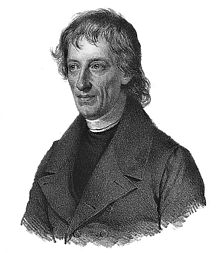Bernard Bolzano
| Bernard Bolzano | |
|---|---|
 |
|
| Born |
5 October 1781 Prague, Kingdom of Bohemia |
| Died | 18 December 1848 (aged 67) Prague, Kingdom of Bohemia |
| Alma mater |
University of Prague (PhD, 1804) |
| Era | 19th-century philosophy |
| Region | Western Philosophy |
| School |
Logical objectivism Utilitarianism |
| Institutions | University of Prague |
|
Main interests
|
Logic, epistemology, theology |
|
Notable ideas
|
Logical objectivism Bolzano's theorem (the first purely analytic proof of the intermediate value theorem) Bolzano–Weierstrass theorem (ε, δ)-definition of limit Least-upper-bound property |
|
Influences
|
|
| Bernard Bolzano | |
|---|---|
| Thesis | Betrachtungen über einige Gegenstände der Elementargeometrie (Considerations on Some Objects of Elementary Geometry) (1804) |
| Academic advisors | František Josef Gerstner |
Bernard Bolzano (/bɒlˈtsɑːnoʊ/; German: [bɔlˈtsaːno]; born Bernardus Placidus Johann Nepomuk Bolzano; 5 October 1781 – 18 December 1848) was a Bohemian mathematician, logician, philosopher, theologian and Catholic priest of Italian extraction, also known for his antimilitarist views.
Bolzano wrote in German, his mother tongue. For the most part, his work came to prominence posthumously.
Bolzano was the son of two pious Catholics. His father, Bernard Pompeius Bolzano, was an Italian who had moved to Prague, where he married Maria Cecilia Maurer who came from Prague's German-speaking family Maurer. Only two of their twelve children lived to adulthood.
Bolzano entered the University of Prague in 1796 and studied mathematics, philosophy and physics. Starting in 1800, he also began studying theology, becoming a Catholic priest in 1804. He was appointed to the then newly created chair of philosophy of religion at Prague University in 1805. He proved to be a popular lecturer not just in religion but also in philosophy, and was elected Dean of the Philosophical Faculty in 1818. Bolzano alienated many faculty and church leaders with his teachings of the social waste of militarism and the needlessness of war. He urged a total reform of the educational, social, and economic systems that would direct the nation's interests toward peace rather than toward armed conflict between nations. Upon his refusal to recant his beliefs, Bolzano was dismissed from the university in 1819. His political convictions (which he was inclined to share with others with some frequency) eventually proved to be too liberal for the Austrian authorities. He was exiled to the countryside and at that point devoted his energies to his writings on social, religious, philosophical, and mathematical matters. Although forbidden to publish in mainstream journals as a condition of his exile, Bolzano continued to develop his ideas and publish them either on his own or in obscure Eastern European journals. In 1842 he moved back to Prague, where he died in 1848.
...
Wikipedia
